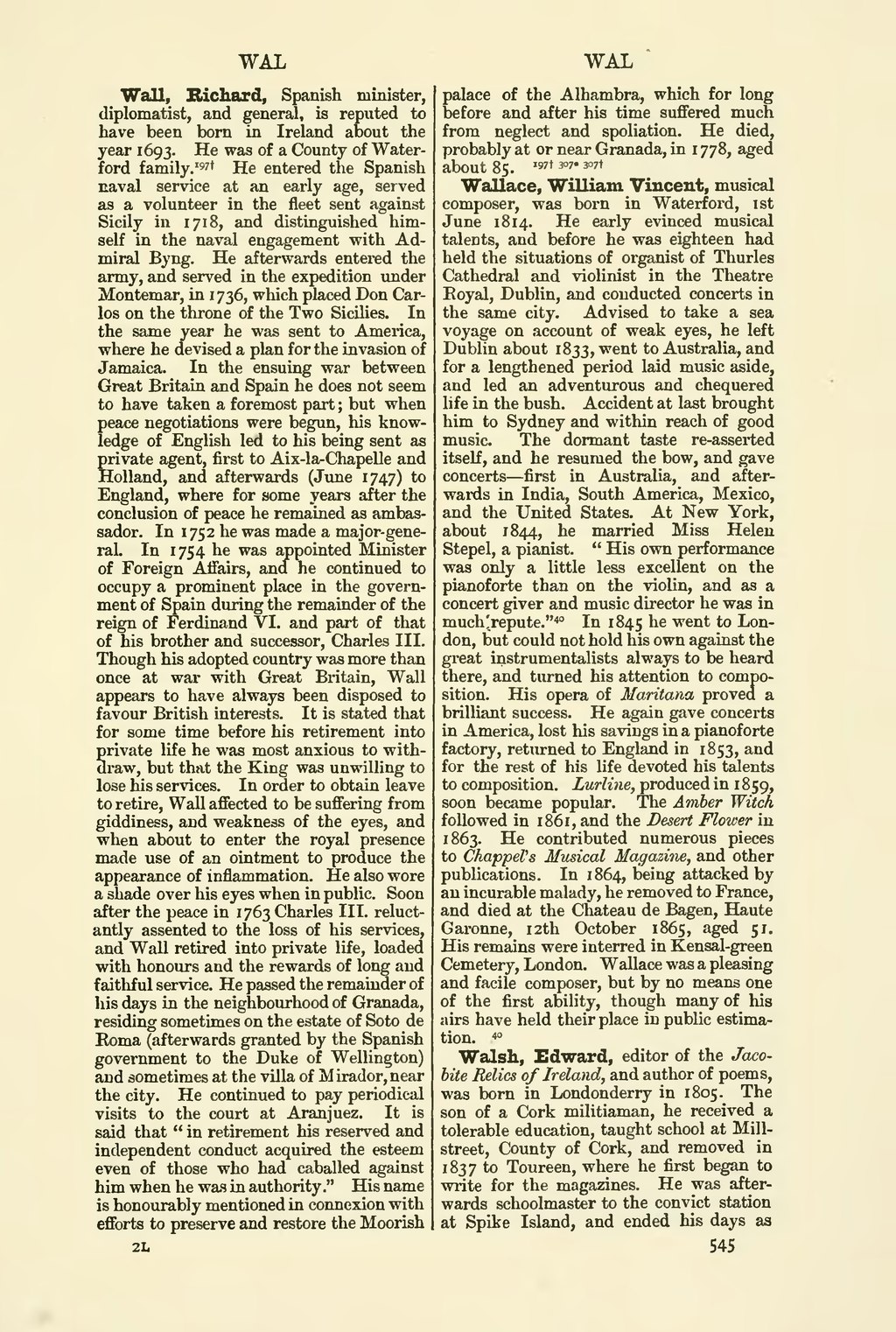Wall, Richard, Spanish minister, diplomatist, and general, is reputed to have been born in Ireland about the year 1693. He was of a County of Waterford family.197† He entered the Spanish naval service at an early age, served as a volunteer in the fleet sent against Sicily in 1718, and distinguished himself in the naval engagement with Admiral Byng. He afterwards entered the army, and served in the expedition under Montemar, in 1736, which placed Don Carlos on the throne of the Two Sicilies. In the same year he was sent to America, where he devised a plan for the invasion of Jamaica. In the ensuing war between Great Britain and Spain he does not seem to have taken a foremost part; but when peace negotiations were begun, his knowledge of English led to his being sent as private agent, first to Aix-la-Chapelle and Holland, and afterwards (June 1747) to England, where for some years after the conclusion of peace he remained as ambassador. In 1752 he was made a major-general. In 1754 he was appointed Minister of Foreign Affairs, and he continued to occupy a prominent place in the government of Spain during the remainder of the reign of Ferdinand VI. and part of that of his brother and successor, Charles III. Though his adopted country was more than once at war with Great Britain, Wall appears to have always been disposed to favour British interests. It is stated that for some time before his retirement into private life he was most anxious to withdraw, but that the King was unwilling to lose his services. In order to obtain leave to retire. Wall affected to be suffering from giddiness, and weakness of the eyes, and when about to enter the royal presence made use of an ointment to produce the appearance of inflammation. He also wore a shade over his eyes when in public. Soon after the peace in 1763 Charles III. reluctantly assented to the loss of his services, and Wall retired into private life, loaded with honours and the rewards of long and faithful service. He passed the remainder of his days in the neighbourhood of Granada, residing sometimes on the estate of Soto de Roma (afterwards granted by the Spanish government to the Duke of Wellington) and sometimes at the villa of Mirador,near the city. He continued to pay periodical visits to the court at Aranjuez. It is said that "in retirement his reserved and independent conduct acquired the esteem even of those who had caballed against him when he was in authority." His name is honourably mentioned in connexion with efforts to preserve and restore the Moorish palace of the Alhambra, which for long before and after his time suffered much from neglect and spoliation. He died, probably at or near Granada, in 1778, aged about 85. 197† 307* 307†
Wallace, William Vincent, musical composer, was born in Waterford, 1st June 1814. He early evinced musical talents, and before he was eighteen had held the situations of organist of Thurles Cathedral and violinist in the Theatre Royal, Dublin, and conducted concerts in the same city. Advised to take a sea voyage on account of weak eyes, he left Dublin about 1833, went to Australia, and for a lengthened period laid music aside, and led an adventurous and chequered life in the bush. Accident at last brought him to Sydney and within reach of good music. The dormant taste re-asserted itself, and he resumed the bow, and gave concerts—first in Australia, and afterwards in India, South America, Mexico, and the United States. At New York, about 1844, he married Miss Helen Stepel, a pianist. "His own performance was only a little less excellent on the pianoforte than on the violin, and as a concert giver and music director he was in much repute."40 In 1845 he went to London, but could not hold his own against the great instrumentalists always to be heard there, and turned his attention to composition. His opera of Maritana proved a brilliant success. He again gave concerts in America, lost his savings in a pianoforte factory, returned to England in 1853, and for the rest of his life devoted his talents to composition. Lurline, produced in 1859, soon became popular. The Amber Witch followed in 1861, and the Desert Flower in 1863. He contributed numerous pieces to Chappel's Musical Magazine, and other publications. In 1864, being attacked by an incurable malady, he removed to France, and died at the Chateau de Bagen, Haute Garonne, 12th October 1865, aged 51. His remains were interred in Kensal-green Cemetery, London. Wallace was a pleasing and facile composer, but by no means one of the first ability, though many of his airs have held their place in public estimation. 40
Walsh, Edward, editor of the Jacobite Relics of Ireland, and author of poems, was born in Londonderry in 1805. The son of a Cork militiaman, he received a tolerable education, taught school at Millstreet, County of Cork, and removed in 1837 to Toureen, where he first began to write for the magazines. He was afterwards schoolmaster to the convict station at Spike Island, and ended his days as
545
